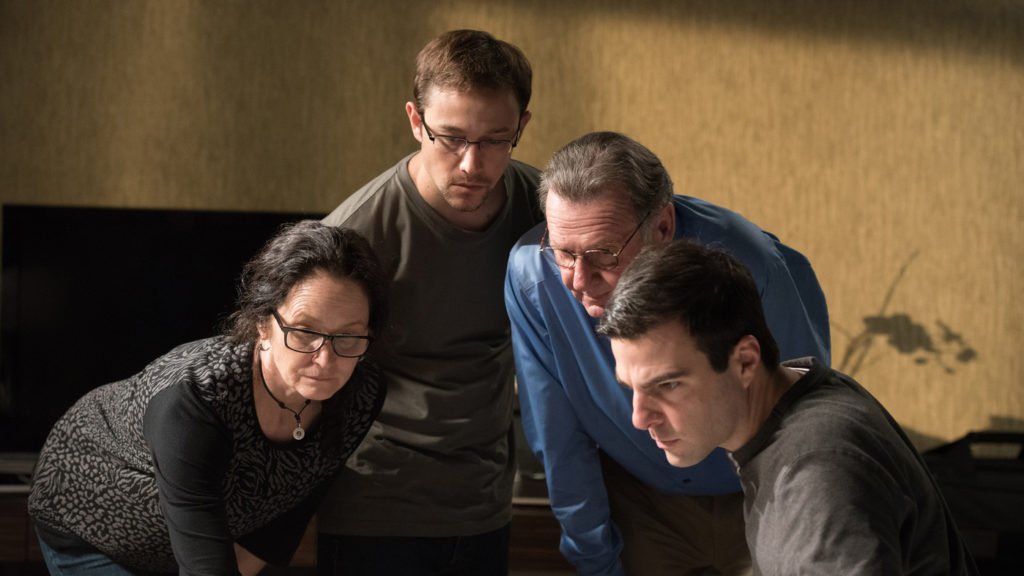When whistleblower Edward Snowden leaked thousands of classified National Security Agency documents on May 20, 2013, it was the largest leak of government secrets in history, exposing myriad government surveillance programs, rocking the American public.
While the motion picture “Snowden” won’t have the same impact on the box office as the leak did on the public, it is a compelling story that accurately depicts Snowden’s time as an employee for the CIA and the NSA. The movie is indeed a one-sided telling of the story, carried by the spectacular performance by Joseph Gordon-Levitt (Snowden) but hindered by the other performances in the film.
Directed by Oliver Stone, the film follows Snowden as he transitions from U.S. Army Special Forces recruit to star pupil in his trainee class at the CIA, to leaker of classified documents. It exhibits Snowden as he becomes more disillusioned with the surveillance of U.S. citizens and people around the world. Snowden’s paranoia of personal surveillance grows when a co-worker shows him a live stream from a woman’s laptop while she unwittingly disrobes. When one of his supervisors at the NSA informs him that he has been surveilling Snowden’s girlfriend, this type of surveillance pushes him over the edge.
The movie’s structure is set so that it jumps between the events that lead up to Snowden’s leak and his rendezvous with journalists Glenn Greenwald, Laura Poitras and Ewen MacAskill in Hong Kong, where he leaks the documents. For viewers familiar with Snowden’s story, this structure is not a problem. For those viewers who don’t know this story, it can be a little confusing. Couple that with Snowden’s jumping around from Geneva, Switzerland, to Maryland, to Tokyo, the movie feels a little choppy.
Joseph Gordon-Levitt brings life and depth to the quiet, quirky computer geek. From his spot-on voice impression, to his portrayal of Snowden’s developing paranoia, to his representation of the whistleblower’s stubbornness when diagnosed with epilepsy — Gordon-Levitt hits it out of the park.
Yet where Gordon-Levitt shines, his castmates stumble. Shailene Woodley, who plays Snowden’s girlfriend, Lindsay Mills, doesn’t have the acting ability to coexist with Gordon-Levitt during their scenes together. She’s also 11 years younger than Gordon-Levitt, while Snowden is only five years older than Mills. When they argue about her use of her computer, Woodley sounds more like a whiny teenager than a love interest.
Gordon-Levitt is also the only A-list actor in the film, besides Nicholas Cage. He carries a cast that includes Zachary Quinto, Timothy Olyphant, Scott Eastwood and Melissa Leo. For similar reasons, it can be difficult to have such a dialogue-driven movie with only one actor who can really carry a scene — Gordon-Levitt — and a few others, such as Cage, who suck the life out of any scene they’re in.
That being said, Snowden is still a good movie. The film brings a national issue to the silver screen and does an excellent job of showing audience members why they should care about mass surveillance. The story is incredibly accurate and recreates scenes from the Snowden documentary, “Citizenfour,” extremely well. Snowden is maybe the most captivating story of the 21st century, and Stone tells it well.
However, it’s clearly a pro-Snowden story. Those who want to watch a movie that tries to tackle the question of whether Snowden is a traitor or a hero won’t enjoy the film, as it makes him out to be the latter. Likewise, those who want someone in the movie to make the case for the current state of mass surveillance in the U.S., also won’t be enthused.
Snowden is a riveting movie that is carried by a strong, young actor and tells an honest story about the fugitive who changed the landscape of American politics. Is it a cinematic masterpiece? No. Is it worth the $11? Definitely.




















